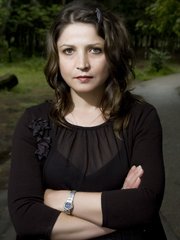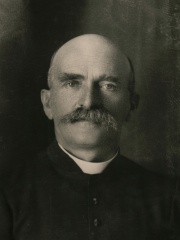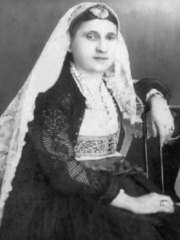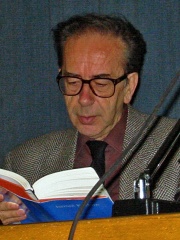
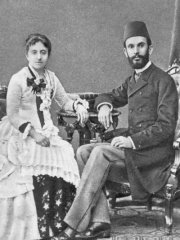
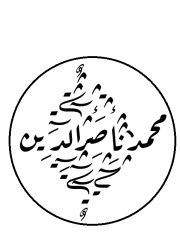
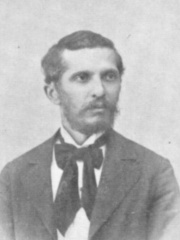
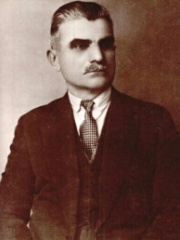
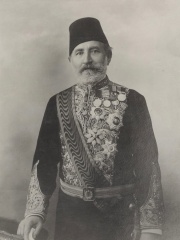
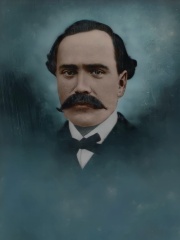
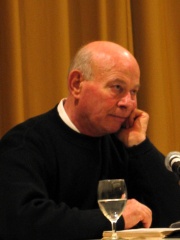
The Most Famous
WRITERS from Albania
Top 10
The following people are considered by Pantheon to be the top 10 most legendary Albanian Writers of all time. This list of famous Albanian Writers is sorted by HPI (Historical Popularity Index), a metric that aggregates information on a biography's online popularity. Visit the rankings page to view the entire list of Albanian Writers.

1. Ismail Kadare (1936 - 2024)
With an HPI of 75.57, Ismail Kadare is the most famous Albanian Writer. His biography has been translated into 73 different languages on wikipedia.
Ismail Kadare (Albanian: [ismaˈil kadaˈɾe]; 28 January 1936 – 1 July 2024) was an Albanian novelist, poet, essayist, screenwriter and playwright. He was a leading international literary figure and intellectual, focusing on poetry until the publication of his first novel, The General of the Dead Army, which made him famous internationally. Kadare is regarded by some as one of the greatest writers and intellectuals of the 20th and 21st centuries, and as a universal voice against totalitarianism. Living in Albania during a time of strict censorship, he devised stratagems to outwit Communist censors who had banned three of his books, using devices such as parable, myth, fable, folk-tale, allegory, and legend, sprinkled with double-entendre, allusion, insinuation, satire, and coded messages. In 1990, to escape the Communist regime and its Sigurimi secret police, he defected to Paris. From the 1990s he was asked by both major political parties in Albania to become a consensual President of the country, but declined. In 1996, France made him a foreign associate of the Académie des Sciences Morales et Politiques, and in 2016, he was a Commandeur de la Légion d'Honneur recipient. Kadare was nominated for the Nobel Prize in Literature 15 times. In 1992, he was awarded the Prix mondial Cino Del Duca; in 1998, the Herder Prize; in 2005, the inaugural Man Booker International Prize; in 2009, the Prince of Asturias Award of Arts; and in 2015, the Jerusalem Prize. He was awarded the Park Kyong-ni Prize in 2019, and the Neustadt International Prize for Literature in 2020. His nominating juror for the Neustadt Prize wrote: "Kadare is the successor of Franz Kafka. No one since Kafka has delved into the infernal mechanism of totalitarian power and its impact on the human soul in as much hypnotic depth as Kadare." His writing has also been compared to that of Nikolai Gogol, George Orwell, Gabriel García Márquez, Milan Kundera, and Balzac. His works have been published in 45 languages. The New York Times wrote that he was a national figure in Albania comparable in popularity perhaps to Mark Twain in the United States, and that "there is hardly an Albanian household without a Kadare book". He was the husband of author Helena Kadare and the father of United Nations Ambassador and UN General Assembly Vice-president Besiana Kadare. In 2023 he was granted citizenship of Kosovo, by president Vjosa Osmani.

2. Sami Frashëri (1850 - 1904)
With an HPI of 67.03, Sami Frashëri is the 2nd most famous Albanian Writer. His biography has been translated into 32 different languages.
Sami bey Frashëri (Turkish: Şemseddin Sami Bey; June 1, 1850 – June 18, 1904) or Şemseddin Sâmi was an Albanian writer, lexicographer, philosopher, playwright and a prominent figure of the Albanian National Awakening, together with his two brothers Abdyl and Naim. He also supported Turkish nationalism against its Ottoman counterpart, along with secularism (anti-clericalism or laicism) against theocracy. Frashëri was one of the sons of an impoverished bey from Frashër (Fraşer during Ottoman rule) in the District of Përmet. He gained a place in Ottoman literature as a talented author under the name of Şemseddin Sami Efendi and contributed to the Ottoman Turkish language reforms. Frashëri's message, however as declared in his book "Albania - What it was, what it is, and what will become of it" published in 1899, became the manifesto of the Albanian National Awakening. He discussed the prospects for a united, free and independent republic of Albania. In this way, beginning with a demand for autonomy and struggle for their own alphabet and education, Frashëri helped the Albanian National Movement develop its claim for independence. His lifetime goal, as that of many other members of the Albanian renaissance was the development and improvement of Albania's culture and eventual establishment of an independent country.

3. Muhammad Nasiruddin al-Albani (1914 - 1999)
With an HPI of 66.84, Muhammad Nasiruddin al-Albani is the 3rd most famous Albanian Writer. His biography has been translated into 28 different languages.
Muhammad Nasir al-Din (born Muhamed Nasirudin Nexhati; 16 August 1914 – 3 October 1999), commonly known as al-Albani, was an Albanian Islamic hadith scholar (muhaddith), regarded as one of the prominent figures of modern Salafism. He was known for his rigorous re-evaluation of hadith literature and for rejecting adherence to traditional schools of jurisprudence. Al-Albani became a controversial yet influential reformer within Sunni Islam. He was twice imprisoned in Syria for his teachings and later lectured at the Islamic University of Madinah at the invitation of Ibn Baz. He authored over 200 works, including Silsalat al-Hadith al-Sahiha and Sifat Salat al-Nabi. His reassessment of canonical hadiths drew both acclaim and criticism, earning him, among Salafis, the title 'al-Bukhari of the contemporary age'

4. Naim Frashëri (1846 - 1900)
With an HPI of 65.49, Naim Frashëri is the 4th most famous Albanian Writer. His biography has been translated into 42 different languages.
Naim bey Frashëri, more commonly Naim Frashëri (; pronounced [naˈim fɾaˈʃəˈɾi]; 25 May 1846 – 20 October 1900), was an Albanian historian, journalist, poet, translator, and one of the most prominent figures of the Albanian National Awakening. Regarded as a pioneer of modern Albanian literature and one of the most influential Albanian cultural icons of the 19th century, he was proclaimed as the national poet of Albania. Frashëri's works explored themes such as freedom, humanity, unity, tolerance and revolution. His twenty-two works consist of fifteen works written in Albanian as well as four in Turkish, two in Greek and one in Persian. He is considered to be the most representative writer of Sufi poetry in Albanian, and having been under the influence of his uncle Dalip Frashëri, he reflected a mingling of Sufism with Western philosophy in his poetical ideals. He had an extraordinarily profound impact on Albanian literature and society during the 20th century, most notably on Asdreni, Gjergj Fishta and Lasgush Poradeci, among many others. Ti Shqipëri, më jep nder, më jep emrin Shqipëtar ("You Albania, you give me honour, you give me the name Albanian"), a memorable line in his poem O malet e Shqipërisë, has been designated as the national motto of Albania. It speaks to unity and freedom and it embodies in its words a sense of pride towards the country and people.
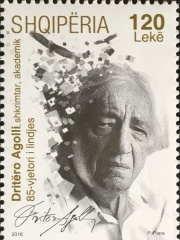
5. Dritëro Agolli (1931 - 2017)
With an HPI of 60.83, Dritëro Agolli is the 5th most famous Albanian Writer. His biography has been translated into 31 different languages.
Dritëro Agolli (13 October 1931 – 3 February 2017) was an Albanian poet, writer and politician. He studied in Leningrad in the Soviet Union, and wrote primarily poetry, but also short stories, essays, plays, and novels. He was head of the League of Writers and Artists of Albania from 1973 until 1992. He was a leading figure in the Albanian Communist nomenklatura.

6. Aleksandër Stavre Drenova (1872 - 1947)
With an HPI of 60.71, Aleksandër Stavre Drenova is the 6th most famous Albanian Writer. His biography has been translated into 23 different languages.
Aleksandër Stavre Drenova (pronounced [alɛkˈsandəɾ staˈvɾɛ dɾɛˈnova]; 11 April 1872 – 11 December 1947), commonly known by the pen name Asdreni, was an Albanian poet, rilindas, translator, writer and the author of the poem which later became the national anthem of Albania. He is regarded as one of the most influential Albanian writers of the 20th century and composed most of his Albanian Renaissance-inspired known works during that period. Born in the village of Drenovë, Asdreni completed his academic studies at the University of Bucharest in Romania where he enthusiastically committed himself to the Independence of Albania from the Ottoman Empire. He maintained close liaison with fellow Gjergj Fishta and Lasgush Poradeci and was notably inspired by the patriots Girolamo de Rada and Naim Frashëri. Rreze dielli, a collection of 99 poems, was his first prominent work which he dedicated to the national hero of Albania Gjergj Kastrioti Skanderbeg. Devoted to Edith Durham a friend of Albania, his second collection of again 99 poems, Ëndrra e lotë, displayed a wider range of themes and motifs as well as his more astonishing maturity. On the 30th of June 2021 the new 10000 Lekë banknote was issued by the Bank of Albania with the main portrait being that of Asdreni.

7. Pashko Vasa (1825 - 1892)
With an HPI of 57.72, Pashko Vasa is the 7th most famous Albanian Writer. His biography has been translated into 15 different languages.
Pashko Vasa (17 September 1825 – 29 June 1892), known as Vaso Pasha or Wassa Pasha (Arabic: واصه باشا, Albanian: Vaso pashë Shkodrani), was an Albanian writer, poet and publicist of the Albanian National Awakening, and Ottoman mutasarrif of Mount Lebanon Mutasarrifate from 1882 until his death.

8. Kostandin Kristoforidhi (1827 - 1895)
With an HPI of 57.71, Kostandin Kristoforidhi is the 8th most famous Albanian Writer. His biography has been translated into 19 different languages.
Kostandin Nelko (22 May 1827 – 7 March 1895), known as Kostandin Kristoforidhi, was an Albanian translator and scholar. He is mostly known for having translated the New Testament into Albanian for the first time in the Gheg Albanian dialect in 1872. He also provided a translation in Tosk Albanian in 1879 thereby improving the 1823 Tosk version of Vangjel Meksi. By providing translation in both dialects, he has the merit of founding the basis of the unification of both dialects into a national language.

9. Fatos Kongoli (b. 1944)
With an HPI of 55.58, Fatos Kongoli is the 9th most famous Albanian Writer. His biography has been translated into 19 different languages.
Fatos Kongoli (born January 12, 1944) is an Albanian novelist.
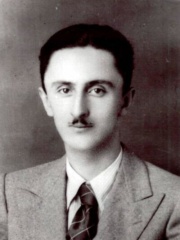
10. Millosh Gjergj Nikolla (1911 - 1938)
With an HPI of 54.29, Millosh Gjergj Nikolla is the 10th most famous Albanian Writer. His biography has been translated into 17 different languages.
Millosh Gjergj Nikolla (Albanian pronunciation: [miˈɫoʃ ɟɛˈrɟ niˈkoɫa]; 13 October 1911 – 26 August 1938), commonly known by the acronym pen name Migjeni, was an Albanian poet and writer, considered one of the most important of the 20th century. After his death, he was recognized as one of the main influential writers of interwar Albanian literature. Migjeni is considered to have shifted from revolutionary romanticism to critical realism during his lifetime. He wrote about the poverty of the years he lived in, with writings such as "Give Us This Day Our Daily Bread", "The Killing Beauty", "Forbidden Apple", "The Corn Legend", "Would You Like Some Charcoal?" etc., severely conveyed the indifference of the wealthy classes to the suffering of the people. The proliferation of his creativity gained a special momentum after World War II, when the communist regime took over the full publication of works, which in the 1930s had been partially unpublished.
People
Pantheon has 18 people classified as Albanian writers born between 1825 and 1968. Of these 18, 6 (33.33%) of them are still alive today. The most famous living Albanian writers include Fatos Kongoli, Elvira Dones, and Ornela Vorpsi. The most famous deceased Albanian writers include Ismail Kadare, Sami Frashëri, and Muhammad Nasiruddin al-Albani. As of April 2024, 2 new Albanian writers have been added to Pantheon including Elvira Dones, and Luljeta Lleshanaku.
Living Albanian Writers
Go to all RankingsFatos Kongoli
1944 - Present
HPI: 55.58
Elvira Dones
1960 - Present
HPI: 51.68
Ornela Vorpsi
1968 - Present
HPI: 49.32
Mimoza Ahmeti
1963 - Present
HPI: 45.52
Gjekë Marinaj
1965 - Present
HPI: 44.79
Luljeta Lleshanaku
1968 - Present
HPI: 42.40
Deceased Albanian Writers
Go to all RankingsIsmail Kadare
1936 - 2024
HPI: 75.57
Sami Frashëri
1850 - 1904
HPI: 67.03
Muhammad Nasiruddin al-Albani
1914 - 1999
HPI: 66.84
Naim Frashëri
1846 - 1900
HPI: 65.49
Dritëro Agolli
1931 - 2017
HPI: 60.83
Aleksandër Stavre Drenova
1872 - 1947
HPI: 60.71
Pashko Vasa
1825 - 1892
HPI: 57.72
Kostandin Kristoforidhi
1827 - 1895
HPI: 57.71
Millosh Gjergj Nikolla
1911 - 1938
HPI: 54.29
Ndre Mjeda
1866 - 1937
HPI: 54.11
Fatos Arapi
1930 - 2018
HPI: 54.08
Shaqe Çoba
1875 - 1954
HPI: 53.51
Newly Added Albanian Writers (2025)
Go to all RankingsOverlapping Lives
Which Writers were alive at the same time? This visualization shows the lifespans of the 11 most globally memorable Writers since 1700.





